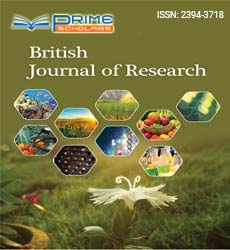Commentary - (2024) Volume 11, Issue 1
Climate Alter Undermines the Microbiological Solidness of Non-refrigerated Nourishments
Daniel Aranda*
Department of Basic Sciences, University of Aberdeen, United Kingdom
*Correspondence:
Daniel Aranda,
Department of Basic Sciences, University of Aberdeen,
United Kingdom,
Email:
Received: 01-Jan-2024, Manuscript No. IPBJR-24-19000;
Editor assigned: 03-Jan-2024, Pre QC No. IPBJR-24-19000 (PQ);
Reviewed: 17-Jan-2024, QC No. IPBJR-24-19000;
Revised: 22-Jan-2024, Manuscript No. IPBJR-24-19000 (R);
Published:
29-Jan-2024, DOI: 10.35841/2394-3718-11.1.06
Description
Microbiology, the scientific discipline dedicated to the study of
microscopic organisms, has revolutionized our understanding
of life on Earth. From the smallest bacteria to complex viruses,
microbiology unravels the mysteries of these unseen entities
that shape our world in profound ways. This comprehensive
exploration delves into the fascinating realm of microbiology,
examining its history, diverse branches, applications, and the
pivotal role microorganisms play in various aspects of life.
Microorganisms, or microbes, constitute a vast and diverse
group of microscopic life forms. Bacteria, viruses, fungi,
protozoa, and archaea are the primary categories, each with
unique characteristics and functions. The foundations of
microbiology were laid by scientific pioneers like Anton van
Leeuwenhoek, who first observed microbes using a simple
microscope. Louis Pasteur and Robert Koch further advanced
the field with their ground breaking work on the germ
theory of disease. Contemporary microbiology leverages
advanced technologies, including DNA sequencing, electron
microscopy, and molecular biology techniques. These tools
have transformed our ability to study microorganisms at the
genetic and molecular levels. Medical microbiology focuses on
the study of microorganisms that cause diseases in humans.
It plays a crucial role in diagnosing and treating infections,
developing vaccines, and understanding the mechanisms of
infectious diseases. Environmental microbiology explores the
role of microorganisms in natural environments. It investigates
their contributions to nutrient cycling, waste treatment, and
the maintenance of ecological balance. Industrial microbiology
harnesses the power of microorganisms for various
applications, including the production of antibiotics, enzymes,
and biofuels. Microbes are also used in waste management and
environmental clean-up. The human body is home to trillions
of microorganisms that collectively form the microbiome.
These microbes play a crucial role in digestion, immunity, and
overall well-being. Pathogenic microorganisms can cause a
range of infectious diseases, from the common cold to severe
conditions like tuberculosis and HIV/AIDS. Understanding the
mechanisms of infection is vital for disease prevention and
treatment. The misuse of antibiotics has led to the emergence
of antibiotic-resistant strains of bacteria, posing a significant
threat to public health. Addressing antibiotic resistance
requires a multidisciplinary approach and global cooperation.
Microorganisms are at the forefront of biotechnological
advances. Genetic engineering, recombinant DNA technology,
and synthetic biology leverage microbial capabilities for
medical, agricultural, and industrial applications. Food
microbiology focuses on the study of microorganisms in food
production, preservation, and safety. It plays a crucial role in
preventing foodborne illnesses and ensuring the quality of
food products. Microorganisms possess the ability to degrade
pollutants and contaminants in the environment. Environmental
bioremediation employs these natural capabilities to clean up
oil spills, polluted water, and contaminated soil. Advancements
in DNA sequencing technologies have fuelled the exploration
of microbial communities in various environments, leading to
breakthroughs in microbiome research and its implications
for health and ecosystems. Synthetic biology involves the
design and construction of new biological entities, often using
microbial systems.
Acknowledgement
None.
Conflict Of Interest
The author’s declared that they have no conflict of interest.
Citation: Aranda D (2024) Climate Alter Undermines the Microbiological Solidness of Non-refrigerated Nourishments. Br J Res. 11:06.
Copyright: © 2024 Aranda D. This is an open-access article distributed under the terms of the Creative Commons Attribution License, which permits unrestricted use, distribution, and reproduction in any medium, provided the original author and source are credited.

